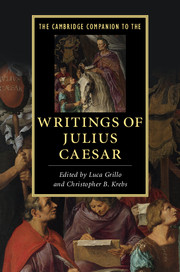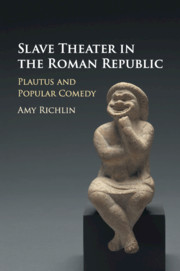Refine search
Actions for selected content:
23990 results in Ancient history
Contents
-
- Book:
- Herodotus: <I>Histories</I> Book VI
- Published online:
- 14 September 2019
- Print publication:
- 21 December 2017, pp v-v
-
- Chapter
- Export citation
Introduction
-
- Book:
- Herodotus: <I>Histories</I> Book VI
- Published online:
- 14 September 2019
- Print publication:
- 21 December 2017, pp 1-38
-
- Chapter
- Export citation
Title match
ΗΡΟΔΟΤΟΥ ΙΣΤΟΡΙωΝ Ζ
-
- Book:
- Herodotus: <I>Histories</I> Book VI
- Published online:
- 14 September 2019
- Print publication:
- 21 December 2017, pp 39-84
-
- Chapter
- Export citation
Frontmatter
-
- Book:
- Herodotus: <I>Histories</I> Book VI
- Published online:
- 14 September 2019
- Print publication:
- 21 December 2017, pp i-iv
-
- Chapter
- Export citation
Maps
-
- Book:
- Herodotus: <I>Histories</I> Book VI
- Published online:
- 14 September 2019
- Print publication:
- 21 December 2017, pp xvi-xxvi
-
- Chapter
- Export citation
Indexes
-
- Book:
- Herodotus: <I>Histories</I> Book VI
- Published online:
- 14 September 2019
- Print publication:
- 21 December 2017, pp 328-342
-
- Chapter
- Export citation
Contents
-
- Book:
- Herodotus: <I>Histories</I> Book VI
- Published online:
- 14 September 2019
- Print publication:
- 21 December 2017, pp v-v
-
- Chapter
- Export citation
List of Figures
-
- Book:
- Herodotus: <I>Histories</I> Book VI
- Published online:
- 14 September 2019
- Print publication:
- 21 December 2017, pp vii-viii
-
- Chapter
- Export citation
Introduction
-
- Book:
- Herodotus: <I>Histories</I> Book VI
- Published online:
- 14 September 2019
- Print publication:
- 21 December 2017, pp 1-38
-
- Chapter
- Export citation
Preface
-
- Book:
- Herodotus: <I>Histories</I> Book VI
- Published online:
- 14 September 2019
- Print publication:
- 21 December 2017, pp ix-x
-
- Chapter
- Export citation
Works Cited
-
- Book:
- Herodotus: <I>Histories</I> Book VI
- Published online:
- 14 September 2019
- Print publication:
- 21 December 2017, pp 303-327
-
- Chapter
- Export citation
List of Figures
-
- Book:
- Herodotus: <I>Histories</I> Book VI
- Published online:
- 14 September 2019
- Print publication:
- 21 December 2017, pp vii-viii
-
- Chapter
- Export citation

The Cambridge Companion to the Writings of Julius Caesar
-
- Published online:
- 20 December 2017
- Print publication:
- 28 December 2017

Slave Theater in the Roman Republic
- Plautus and Popular Comedy
-
- Published online:
- 08 December 2017
- Print publication:
- 28 December 2017
Chapter Four - Hadrian’s Wall
- from Part 2 - Border Control
-
- Book:
- Protecting the Roman Empire
- Published online:
- 17 November 2017
- Print publication:
- 07 December 2017, pp 95-132
-
- Chapter
-
- You have access
- HTML
- Export citation
Part 2 - Border Control
-
- Book:
- Protecting the Roman Empire
- Published online:
- 17 November 2017
- Print publication:
- 07 December 2017, pp 93-176
-
- Chapter
- Export citation
One - A Republic Takes Shape
-
- Book:
- Architecture and Politics in Republican Rome
- Published online:
- 21 September 2017
- Print publication:
- 07 December 2017, pp 1-5
-
- Chapter
- Export citation
Index
-
- Book:
- Protecting the Roman Empire
- Published online:
- 17 November 2017
- Print publication:
- 07 December 2017, pp 247-252
-
- Chapter
- Export citation
Chapter Three - Highways
- from Part 1 - Consolidating Conquest
-
- Book:
- Protecting the Roman Empire
- Published online:
- 17 November 2017
- Print publication:
- 07 December 2017, pp 55-92
-
- Chapter
- Export citation
Acknowledgements
-
- Book:
- Architecture and Politics in Republican Rome
- Published online:
- 21 September 2017
- Print publication:
- 07 December 2017, pp ix-x
-
- Chapter
- Export citation
